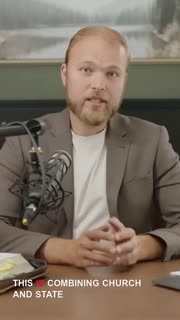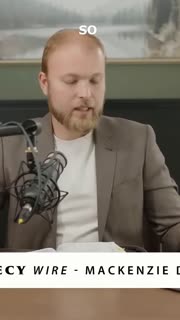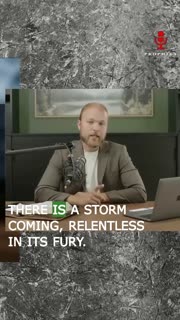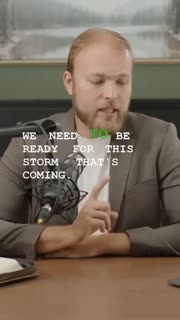Upholding Religious Freedom Amidst Coercive Mandates
Devotional
Sermon Summary
Bible Study Guide
Sermon Clips
1. "We should be for and pro things that are good for the country, but not at the expense of forcing people to do something against their will. God is not a God of force." [03:45] (15 seconds)
2. "This is combining church and state together mingling of churchcraft and statecraft and we should be extremely nervous we should be extremely nervous when we see these things happening and we should be for and pro things that are good for the country but not at the expense of forcing people. To. Do. Something. Against. Their. Will. God is not a god of force." [07:29] (28 seconds)
3. "We need to be so in tuned to our Bibles that we know exactly what is taking place in the end so when we look at the flow. Of. Revelation 13. We need to see that this image of the beast needs to be fully in place before the mark is enforced. Okay, so this image of the beast means that it's going to look and act exactly like the beast." [08:19] (32 seconds)
4. "We have to do what is right. We can't promote doing something wrong because we think that it will go in the wrong direction. We have to do what is right. We have to do right always because it is right. And teaching religion in public schools is not right. It's not that it's right but it's leading to Sunday law so we shouldn't do it. No, it's that it's not right because it's forcing people against their conscience. This is not something that God would approve of." [11:15] (28 seconds)
5. "There is a storm coming, relentless in its fury. Are we prepared to meet it? We have storms spoken of, antitypical storms spoken of in the Bible. We have the flood of Noah. And Jesus said in Matthew chapter 24, Matthew chapter 24, But as the days of Noah were, so shall also the coming of the Son of Man be." [13:35] (33 seconds)
6. "We need to be ready for this storm that's coming. We need to be aware of what these things are going to lead to. And we need to heed that warning. God has been giving us warning after warning to prepare for the final events. These young men had prepared. They understood the commission. They understood the command. All the other Israelites ended up bowing. Because in the midst of a storm is not when you prepare." [17:23] (34 seconds)
7. "The force of the storm destroys everything in its path. The weak trees and structures when a storm hits don't get stronger. They get destroyed. They get taken away in the flood. Only those things that have been built beforehand will be able to weather the storm. And we need to build it on the solid rock. The rock, the foundation, the platform that God has laid." [17:58] (33 seconds)
8. "Let us realize that these are very incredible times that we are living in. And we need to be ready for them. And we need to be sharing with everyone what is happening and how this is fulfilling Bible prophecy." [18:33] (15 seconds)
Ask a question about this sermon
2. "This is combining church and state together mingling of churchcraft and statecraft and we should be extremely nervous we should be extremely nervous when we see these things happening and we should be for and pro things that are good for the country but not at the expense of forcing people. To. Do. Something. Against. Their. Will. God is not a god of force." [07:29] (28 seconds)
3. "We need to be so in tuned to our Bibles that we know exactly what is taking place in the end so when we look at the flow. Of. Revelation 13. We need to see that this image of the beast needs to be fully in place before the mark is enforced. Okay, so this image of the beast means that it's going to look and act exactly like the beast." [08:19] (32 seconds)
4. "We have to do what is right. We can't promote doing something wrong because we think that it will go in the wrong direction. We have to do what is right. We have to do right always because it is right. And teaching religion in public schools is not right. It's not that it's right but it's leading to Sunday law so we shouldn't do it. No, it's that it's not right because it's forcing people against their conscience. This is not something that God would approve of." [11:15] (28 seconds)
5. "There is a storm coming, relentless in its fury. Are we prepared to meet it? We have storms spoken of, antitypical storms spoken of in the Bible. We have the flood of Noah. And Jesus said in Matthew chapter 24, Matthew chapter 24, But as the days of Noah were, so shall also the coming of the Son of Man be." [13:35] (33 seconds)
6. "We need to be ready for this storm that's coming. We need to be aware of what these things are going to lead to. And we need to heed that warning. God has been giving us warning after warning to prepare for the final events. These young men had prepared. They understood the commission. They understood the command. All the other Israelites ended up bowing. Because in the midst of a storm is not when you prepare." [17:23] (34 seconds)
7. "The force of the storm destroys everything in its path. The weak trees and structures when a storm hits don't get stronger. They get destroyed. They get taken away in the flood. Only those things that have been built beforehand will be able to weather the storm. And we need to build it on the solid rock. The rock, the foundation, the platform that God has laid." [17:58] (33 seconds)
8. "Let us realize that these are very incredible times that we are living in. And we need to be ready for them. And we need to be sharing with everyone what is happening and how this is fulfilling Bible prophecy." [18:33] (15 seconds)








